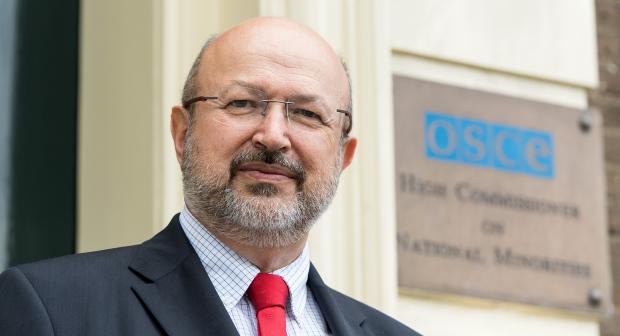Multilingual education: Creating equal chances for everyone
Most societies are multilingual. A language can be crucial to one’s identity and membership in a community. Languages spoken by a minority need not to be an obstacle to an integrated and cohesive society. If they are respected and cultivated properly, they can enrich society and spur development.
Promoting multilingual education has been a priority for successive OSCE High Commissioners on National Minorities since this institution was created in the early 1990s.

Diversity is not a burden, it is our source of strength.
Lamberto Zannier OSCE High Commissioner on National Minorities
In December 2017, the High Commissioner hosted the first-ever international School on Multilingual and Multicultural Education in Shymkent, Kazakhstan.
Under the theme “Multilingual and Multicultural Education counts for Integration and Sustainable Development”, the five-day school brought together more than 100 education officials and practitioners from seven time zones and ten countries in Eastern Europe, South Caucasus and Central Asia.
“Initiatives such as this are necessary to build capacity, improve teaching methodologies and exchange best practices and lessons learned,” said participant Kakha Gabunia, Associate Professor at the Tbilisi State University in Georgia.
The participating teachers visited several local schools in South Kazakhstan, which pilot or run multilingual education programmes with the support of the OSCE High Commissioner’s Central Asia Education Programme.
Maintaining a delicate balance
Mother tongue-based multilingual education helps governments to achieve the delicate balance between ensuring fluency in the state language on the one hand, and preserving and accommodating minority languages and identities on the other. While command of the state language is often necessary for public sector positions, multilingual education ensures that all young people, and particularly those from national minorities, have the same opportunities when seeking employment.
Multilingual education prevents communal segregation and minimizes the risk of a two-tier society divided by language. In short, multilingual education helps to create equal chances for everyone.
International instruments relating to minority language education declare that minorities not only have the right to maintain their identity through the medium of their mother tongue but that they also have the right to integrate into and participate in the wider national society by learning the state language.
The Hague Recommendations Regarding the Education Rights of National Minorities (1996) produced by the OSCE High Commissioner on National Minorities.
Peer-to-peer support
Despite multilingualism being a feature of almost all OSCE participating States, education officials and practitioners have few opportunities to exchange experiences and good practices from other countries.
For this reason, the international school put a strong emphasis on networking opportunities for the participants and helped expand the network of teachers involved in implementing multilingual education. For many of the education officials and practitioners, especially those from Mongolia and Moldova, this was their first opportunity to exchange experiences of multilingual teaching with international peers. This networking aspect will be further developed through an international online platform that will allow teachers to continuously share ideas and experiences.
“The research and experience from different countries presented here repeatedly showed the importance of the mother tongue as a basis for the successful learning of second and third languages being taught at school,” said Bakhadyr Nuraliev, School Director at School Gymnasium No. 107 in Shymkent. “It was useful for me to learn more about the crucial role of language teachers within multilingual education programmes and the ways to introduce changes in teaching patterns for the successful implementation of multilingual education.”
OSCE High Commissioner on National Minorities Lamberto Zannier said education must aim at empowering new generations with the necessary tools to communicate with each other and be constructive members of a diverse society.
“Multilingual education is one of the instruments that can be used to achieve this goal,” he said. “My Institution provides long-term support and expertise throughout the OSCE region to help participating States bridge the divides in diverse societies. Diversity is not a burden, it is our source of strength.”



